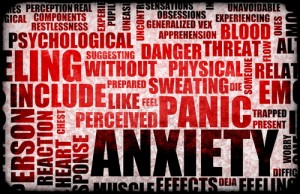 Are you looking for natural ways to reduce anxiety? Well, relief may be in sight. In fact, it may be at your local grocery store. While drug treatments and therapy may be the best option in some cases, a few changes in your diet and lifestyle may also help—and with little risk of side effects. Here’s some simple (and tasty) suggestions that might help calm your nerves.
Are you looking for natural ways to reduce anxiety? Well, relief may be in sight. In fact, it may be at your local grocery store. While drug treatments and therapy may be the best option in some cases, a few changes in your diet and lifestyle may also help—and with little risk of side effects. Here’s some simple (and tasty) suggestions that might help calm your nerves.
1. Eat a balanced diet and avoid processed foods.
You’ve heard it before, but research continues to confirm the importance of diet in mental health. Recently, in a Norwegian population, researchers at University of Melbourne showed that those who eat healthier, more traditional diets tend to have lower rates of depression and anxiety than those who eat typical western diets—full of processed and unhealthy foods.
2. Exercise regularly.
People who exercise are also less likely to be depressed or anxious. And with anxiety, the effects are immediate. University of Maryland researchers recently demonstrated that just 30 minutes of moderate exercise was enough to both reduce baseline anxiety levels and keep anxiety low during a stress test that followed. So, if you’re anxious at the moment or dreading an upcoming stressful event, think about stepping out for a brisk walk—it really works.
3. Resist that second mug of coffee.
Caffeine in moderation is fine for most adults, but it’s easy to overdo it. The effects—including increased anxiety–can sneak up on you. So how much is too much? If you are particularly sensitive, you might try avoiding it completely. But in most cases, aim for less than 200 mg caffeine per day—approximately 12 ounces of coffee. If you just can’t bear to let go of your coffee mug, half-caff or decaf is an easy fix. Also, avoid soda altogether and switch to herbal teas, which are caffeine free.
4. Eat more salmon.
And sardines, walnuts, and flaxseed. Fish and nuts are great sources of omega-3 fatty acids. Omega-3’s help reduce depression, and may help reduce anxiety, as well—at least animal models suggest. In one recent study,, rats with omega-3-rich diets were shown to be less sensitive to stress, while omega-3-deficient rats were more sensitive. Several other studies support a link between omega-3s and anxiety. While human studies await, it can’t hurt to enrich your own diet, as omega-3s have a number of other benefits for the brain and body as a whole.
5. Drink more milk.
Women, if your anxiety is PMS-related, you may be calcium deficient. Studies of premenstrual dysphoric disorder—severe PMS—have shown relief comes from increasing calcium and vitamin D intake. Thiamine and Riboflavin also help. Sources of these include beans, sunflower seeds, spinach, yogurt, and eggs—all of which tie back into the healthy, balanced diet in tip #1.
6. Break the cycle of sugar addiction.
Easier said than done—especially when anxiety is what triggers your cravings. But self-medicating with sugar and simple carbohydrates (e.g. white flour) can put you in an addiction cycle that activates the same dopamine and serotonin reward pathways in the brain as drugs of abuse. With addiction comes withdrawal, and with withdrawal comes—you guessed it—more anxiety. If you can’t avoid sugar or simple carbs altogether, try taking small steps. Replace your midnight snack with a handful of grapes. Replace your dinner roll with an extra helping of vegetables. And when you can, replace sugar with honey; there is some evidence that honey actually has anxiety-reducing qualities.
Anxiety can be a serious disorder that interferes with your ability to function in everyday life. If this is the case, don’t hesitate to contact a professional. These tips are not a cure-all, but when used in conjunction with other treatments, or when used by those with mild to moderate anxiety, they may give some relief—as well as improve overall health—in many cases.
Click Here For Article References:Jacka FN, Mykletun A, Berk M, Bjelland I, Tell GS. (2011) The association between habitual diet quality and the common mental disorders in community-dwelling adults: the Hordaland Health study. Psychosom Med 73: 483-490.
Guszkowska M. (2004) Effects of exercise on anxiety, depression, and mood. Psychiatr Pol. 38: 611-620.
Smith JC. (2012) Effects of emotional exposure on state anxiety after acute exercise. Med Sci Sports Exerc. Epub ahead of print.
Hennebelle M, Balasse L, Latour A, Champeil-Potokar G, Denis S, Lavialle M, Gisquet-Verrier et al. (2012) Influence of omega-3 fatty acid status on the way rats adapt to chronic restraint stress. PLoS One. 7: e42142
Stahl LA, Begg DP, Weisinger RS, Sinclair AJ. (2008) The role of omega-3 fatty acids in mood disorders. Curr Opin Investig Drugs. 9: 57-64.
Thys-Jacobs S. (2000) Micronutrients and the premenstrual syndrome: the case for calcium. J Am Coll Nutr. 19: 220-227.
Chocano-Bedoya PO, Manson JE, Hankinson SE, Willett WC, Johnson SR, Chasan-Taber L, Ronnenberg AG, Bigelow C, Bertone-Johnson ER. (2011) Dietary B vitamin intake and incident premenstrual syndrome. Am J Clin Nutr. 93: 1080-1086.
Fortuna JL. (2012) The obesity epidemic and food addiction: clinical similarities to drug dependence. J. Psychoactive Drugs 44: 56-63.
Chepulis LM, Starkey NJ, Waas JR, Molan PC. (2009) The effects of long-term honey, sucrose or sugar-free diets on memory and anxiety in rats. Physiol. Behav. 97: 359-368.
Image Credit: Shutterstock/kentoh















very helpful article.
With all due respect, drinking cow’s milk has nothing to do with human’s health (excpet for making it worse, of course). I won’t say more, but have you heard about Dr. Greger’s lecture, “Uprooting the leading causes of death”? It’s one of the best in this subject.
P.S. Tecnichally, it’s possible that milk helps with what you’re talking about, but it simply isn’t worth it.